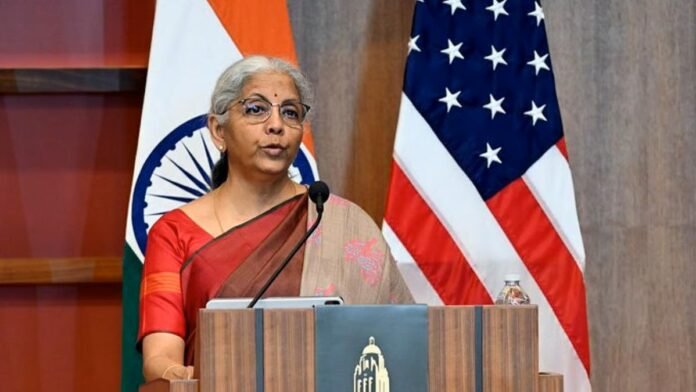Union Finance Minister Nirmala Sitharaman has cut short her official visit to the United States and Peru in the wake of the tragic terror attack in Jammu and Kashmir’s Pahalgam region. The attack, which left nine Indian Army personnel dead and several others injured, has triggered a wave of national grief and urgency at the highest levels of government.
The Finance Minister, who was in Washington D.C. to attend the Spring Meetings of the International Monetary Fund (IMF) and the World Bank, was scheduled to proceed to Lima, Peru, for the Asia-Pacific Economic Cooperation (APEC) Finance Ministers’ meeting. However, following high-level consultations late Monday night, she canceled the Peru leg of the trip and boarded a return flight to New Delhi early Tuesday morning.
A Sudden Shift in Priorities
According to sources within the Ministry of Finance, Sitharaman was in the middle of a bilateral discussion with global economic leaders when she received updates on the Pahalgam ambush. Within hours, she convened an emergency meeting with Indian diplomats and financial representatives in Washington, informing them of her decision to return home.
“India is grieving. At this moment, the nation needs unified leadership more than anything,” a senior official from her team stated. “While global economic cooperation is vital, national security takes absolute precedence.”
The Attack That Shook the Nation
The terror attack took place in the picturesque Pahalgam region, a hotspot for tourism that has recently seen a surge in visitors as Kashmir’s summer season begins. Militants ambushed an Army convoy using IEDs and automatic rifles in a targeted and brutal operation.
Security forces responded swiftly, but the intensity of the attack resulted in multiple fatalities. The incident has sparked nationwide outrage and demands for a firm response against the perpetrators and their handlers.
No terror outfit has officially claimed responsibility yet, but security agencies believe it bears the hallmark of Pakistan-backed militant groups active in South Kashmir.
Domestic Stability Over International Engagements
Nirmala Sitharaman’s return adds to the growing list of top-level Indian leaders choosing national duty over international commitments. Prime Minister Narendra Modi also cut short his diplomatic visit to Saudi Arabia earlier this week after the attack.
Sitharaman’s early exit from the IMF-WB meetings was noted internationally. The IMF Managing Director, Kristalina Georgieva, extended her condolences to the Indian delegation and expressed solidarity with India’s fight against terrorism. “Our thoughts are with the families of those who lost their lives in the tragic attack. India has shown incredible resilience, and we stand with them during this difficult time,” she said.
Political and Strategic Implications
Sitharaman’s decision is not only seen as a moral and symbolic gesture but also a strategic move. As Defence Minister from 2017 to 2019, she played a key role in military policy decisions during volatile periods along the India-Pakistan border. Her early return signals that the Centre may soon roll out a multi-pronged response—strategic, diplomatic, and economic—to address both immediate and long-term security threats.
She is expected to join a high-level security briefing upon arrival in Delhi, alongside Defence Minister Rajnath Singh, Home Minister Amit Shah, and National Security Advisor Ajit Doval. Sources say she will also review budgetary provisions for the Ministry of Defence and internal security in light of the latest developments.
A Somber Homecoming
The Finance Minister’s return is symbolic of the government’s zero-tolerance stance on terrorism. It also highlights the delicate balance Indian leaders must strike between global engagement and domestic responsibility, especially during times of national crisis.
As India mourns its brave soldiers and the families they leave behind, Sitharaman’s decision serves as a reminder that in moments of deep national tragedy, leadership is not just about policy—it’s about presence, empathy, and unwavering commitment to the nation’s core values.

